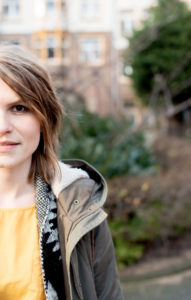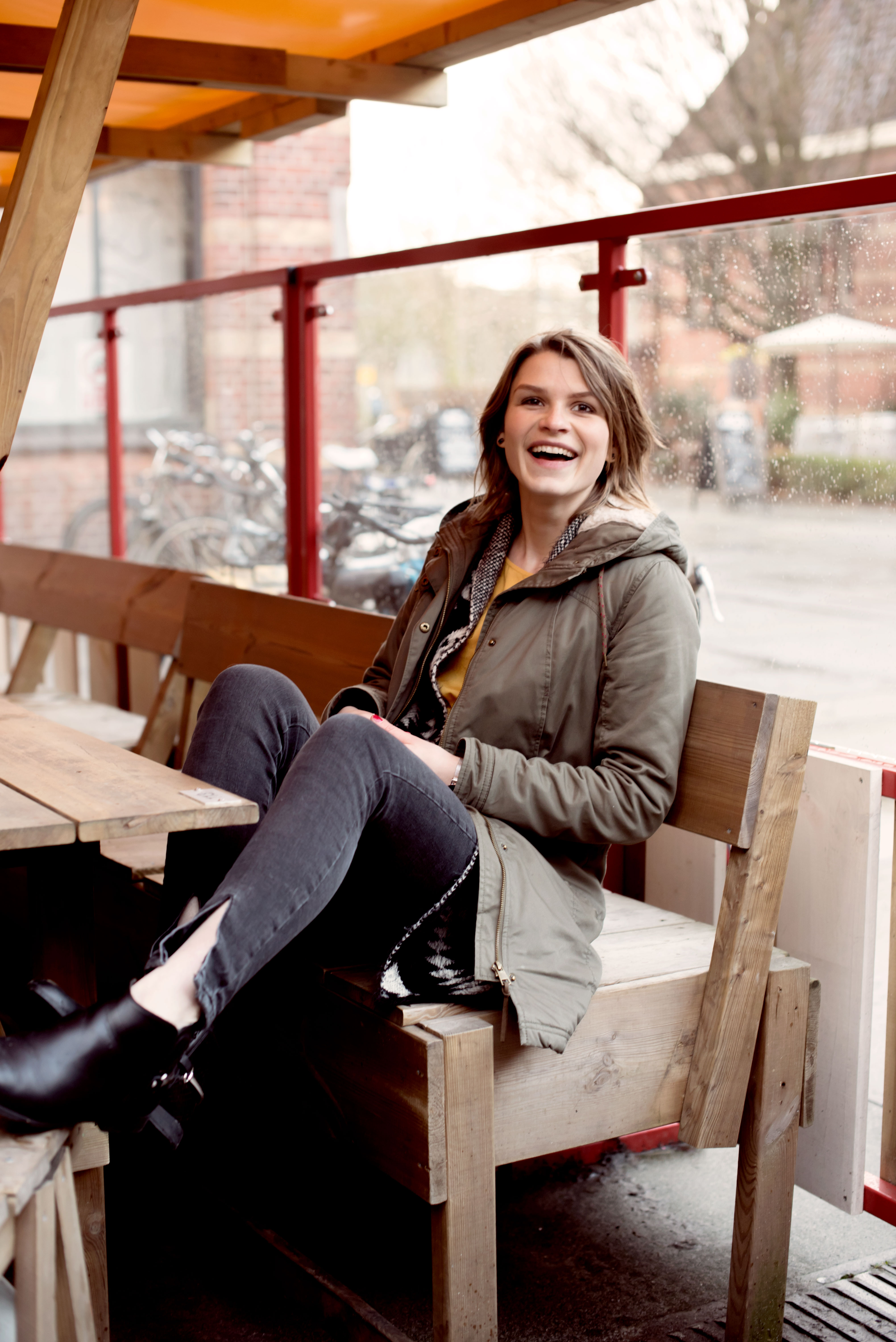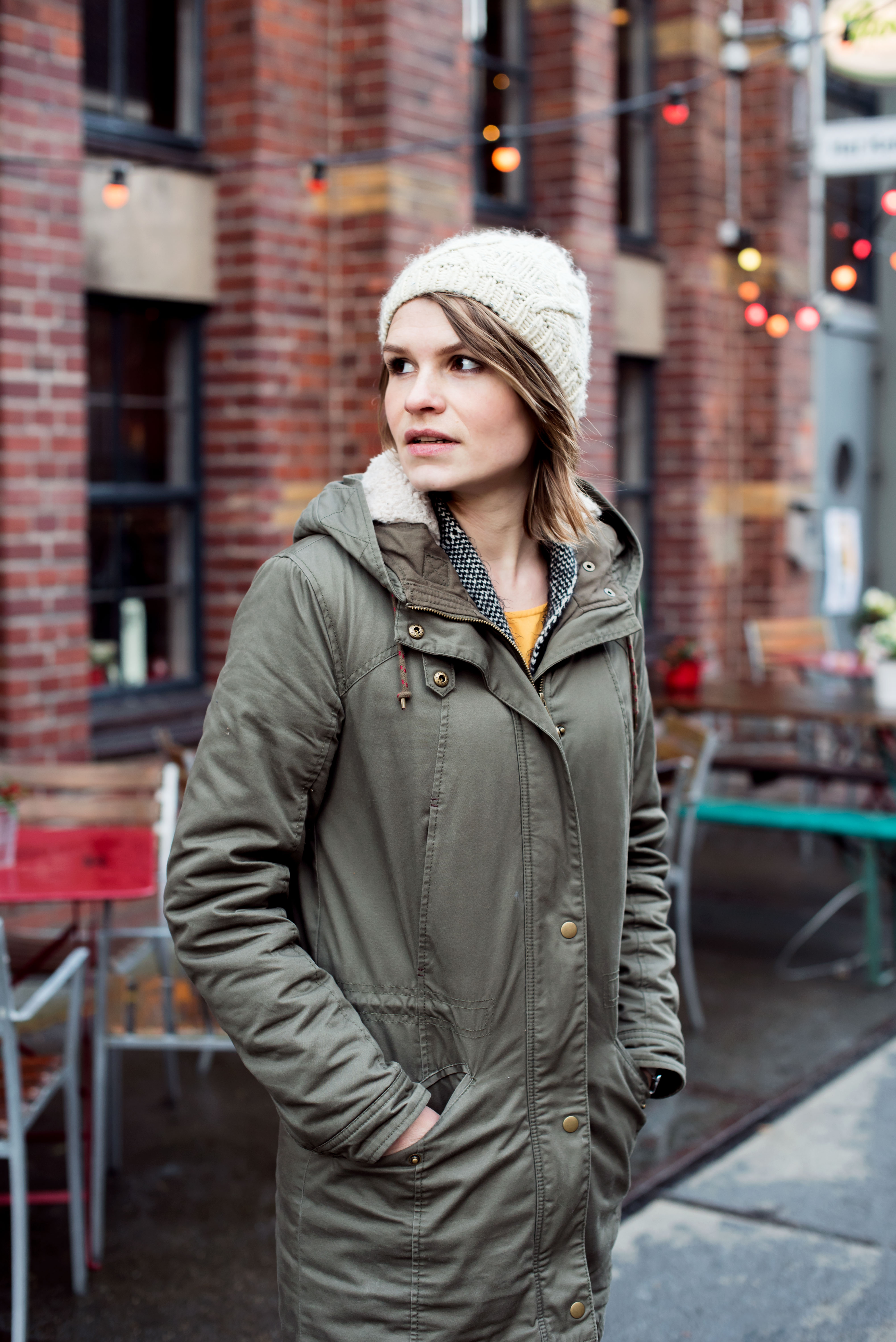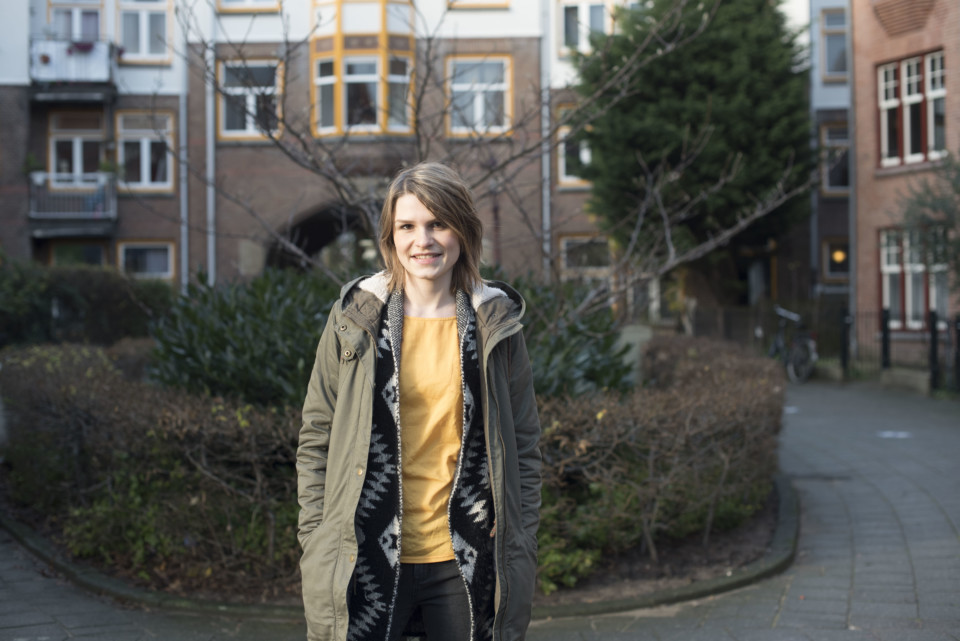G E M M A
Amsterdam | 2018

G E M M A
City — Amsterdam
Age — 31
Love life — Married
Profession — Communications Manager International Conservation NGO
Years in Amsterdam — 8
Location — Spaarndammerbuurt & Westerpark
T H E A M S T E R D A M S T O R I E S
‘WE NEED
TO PRACTICE
EMPATHY’

- What makes you really happy?
“When everything falls into place, because you’re in a spot where you can totally be yourself. Of course I have this feeling at home, I’m totally relaxed when I’m watching the birds outside doing their thing. I also love working for an organisation with people who really know me and value me for who I am. In that kind of relaxed atmosphere I can just be, instead of being ‘on’ all the time. Knowing you can be yourself gives you peace of mind.”
- What is your best personality trait?
“I’m trustworthy. Whenever I make a promise, I’ll come through. I can be quite disappointed or hurt when people don’t keep their promises. If it happens it always makes me wonder, were they sincere when they made the promise, or did they just say something random? I’m also trustworthy in the sense that my friendships are for the long run. I’m not a social butterfly. And although I suppose this is more of a talent than a trait, I’m also good at observing, reflecting and seeing the bigger picture. It’s not only useful at work, but in friendships as well. My friends love to talk to me because I can help them gain some useful insights.”
- What makes you different than other people?
“I guess I am conscious of the fact that my life here in Amsterdam is different from that of many other people who were born in other places in the world. I realise that we live in ‘the privileged West’. We have so many rights and opportunities here. A lot of countries I work with face government corruption. Whether you can achieve anything then becomes more dependent on external factors. For example, a veterinarian from Armenia I know can’t find a job, because all available jobs go to rich people’s friends. And in some other place I know of, people get chased away from their own homes because businesses need that space, even though they’ve been living there forever. It’s all super unjust. I see the world as a global community. We are in this together, and we must fix this together. Especially because the Western economy and prosperity are directly related to the problems people experience in other countries. For example, the plantations producing the palm oil so eagerly consumed in the West cause giant environmental problems in their home country. People should be more aware of that.” - What is your biggest struggle?
“Finding the balance between what I want to achieve and what is already there. What I want to achieve keeps me going, but most of the time the finish line is so far away that I feel a bit discouraged. When actually I should be focusing on the steps I’ve taken so far, that got me to where I am. This also applies to where I think we, as a society, should strive towards versus reminding myself of where we come from in terms of poverty, equal rights, etc. In the same vein, at some point in my relationship I was struggling with what I thought I wanted in a partner ideally, as opposed to who the person I loved really was. Again, I decided to focus on what I have. My husband is a very high-spirited and carefree person who is a great counterpoint to many aspects in my life and character, like my tendency to always want to achieve more and focusing on the heavy, serious issues. He reminds me to sometimes live in the moment, let go a little, and look at things more light-heartedly.”

- What is your biggest disappointment?
“That global scale efforts to stop climate change and to structure what’s happening on our planet in a more sustainable way are not going fast enough. We should be putting in an effort as one world society, but people seem to be putting up fences instead. With Trump withdrawing from the climate convention as the epitome of all that. It sometimes feels like we’re taking two steps forward and ten steps back. It’s not simply disappointing to me, it really makes me angry. What should be done is so obvious, but short-term thinking prevails. It drives me nuts that people don’t realise or care that what is good for the individual, isn’t necessary good for society. Trump does it all the time; he only thinks about what works for a small group of Americans. But guess what – they are not the only ones on the planet.
I see the same thing happening in Amsterdam. People rent out their homes to rich expats for crazy amounts of money. I understand the individual importance of earning money, but I think the decision is often made too quickly. I hope people will look at the bigger picture and think about what we should be aiming for as a city and a society. After all, we are our society, I really feel like an intrinsic part of it. And that realization is where it all starts. I hope we will inspire each other to feel responsible and act accordingly, so that we can move our society forward together.” - What is your biggest life lesson?
“When my grandfather passed away last year, I wrote a poem for him about the tree he had planted when I was born. I compared him to that tree, saying that he had offered his grandchildren a very stable and safe place. It made me realise how important it is to have a safe haven where you can be you completely. It’s what they said in this podcast I listened to recently: ‘Love shouldn’t be weighed.’ When you’ve just met someone, whether it’s in love, friendship or work, you’re still on the scale, so you’re showing a better version of yourself. But once you won someone’s love or appreciation, you should be able to just be you.”
- What is the best advice someone ever gave you?
“At work they told me I have the tendency to mention a problem, then immediately offer a solution. When it’s actually more useful to allow people some time to realise that there is a problem in the first place, so that they’ll become invested in solving it.
It’s not so much advice, but the way I was raised also taught me a lot. My parents were there for me whenever I really needed help, but first they let me struggle a bit. For example, if I wanted to go somewhere, they didn’t just drive me over, they let me cycle there by myself. Those experiences are really precious to me, because they taught me to deal with setbacks. I think that’s what growing up is about, finding your own way out of situations, dealing with them, becoming self-relient.” - What advice would you give other women in Europe?
“To actively try to stay open-minded. Don’t think that your truth is everyone’s truth. Most people’s default mode is to look at the world from their own frame of reference and judge too quickly. But the only way to have any kind of successful society is if we practice empathy and try to see the other person’s point of view. It’s so enriching when you encounter other ways to view the world.
A final piece of advice is to find happiness in small things. I read about it in blog called, Wait… but why?. The author says: ‘Life is a picture, but you live in a pixel.’ Rather than zooming out all the time, you should make sure you’re happy with your everyday life. Make a list of things that give and drain energy and make sure you have enough ‘givers’ during your day. For me, it’s things like reading the newspaper on Saturday.” - What is your biggest sadness?
“That my arm and shoulder were hurt so badly I can’t ever play handball again. I had physiotherapy to make it better, but it accomplished nothing. It was also quite frustrating that everyone around me expected me to get better while I couldn’t. I felt like I needed to explain myself all the time, up to the point where it started to feel like I somehow failed. In our consumption society people tend to expect that as long as you put in enough effort, anything can be manufactured. But that isn’t always true.” - What are you insecure about?
“In situations where I have to respond on the spot, I feel insecure about my answer not being sufficient, or useful enough. I always need time to reflect and form an opinion. I can’t have an opinion about something when I don’t have all the necessary information. I need to feel that I know what I’m talking about. I admire that boldness in other people who just say whatever comes to mind, but I just physically cannot. I freeze and stay silent. But when I do have an opinion, you can be sure it’s real.” - What does Amsterdam mean to you?
“I love history, so I like the fact that Amsterdam is an old city. I like that something existed before us, I feel part of the whole. And I love the down-to-earthness and directness of the people here. I’m very straightforward myself, so I fit right in. I also really appreciate the equality here. When you walk into a typical Dutch pub, this down-to-earth approach and sense of equality really show. There is nothing fancy or chic about the bar and everyone will be standing next to everyone else having a beer. I think women in Amsterdam enjoy this equality. They don’t mind paying or sharing the bill, and they tend to be offended when a guy tries to treat them like a little princess. I can relate to that – just be yourself.”
Photos by Mabel van den Top

